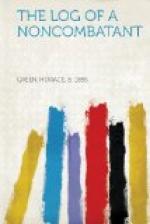I mention this incident—the sort of thing that must have existed everywhere, if one had eyes to see it—merely because it gave a glimpse through the veil of public optimism into the wells of sorrow hidden for the sake of public duty. Military and official Berlin was “staged,” one might almost say. It was on show to impress the neutral stranger, no less than its own inhabitants, with the glorious sense of victory.
But beneath it lay untold suffering which could be endured only because of such united loyalty and team play as the world has seldom seen.
This undercurrent of suffering, which increased week by week as the writing on the wall grew longer, was in pitiful contrast to the enthusiasm with which the women sent their men and sons away to war. More than once I watched troops drilling at Spandau Hof, the great barracks and training-grounds, a few kilometers west of the city. When, on the evening of my first visit, a half dozen battalions of Landwehr, just whipped into shape, entrained for the front, the people threw bits of earth upon them, and, according to custom, stuck green twigs in the end of every Mauser barrel, that each man might carry a bit of the Vaterland with him on to the enemy’s soil. In unspotted field uniforms, and helmets still without the green-gray canvas service covering, they clattered past the reviewing officers, each right leg coming down with the thumping goose-step salute, until halls and barracks echoed with the staccato tread of thousands of hob-nailed boots. The lusty military band blazoned out “Die Wacht am Rhein” and other martial airs, until the creepers began to run up and down your back and you felt a lump rising in your throat. Friends, relatives, widows, mothers already in black for other sons, and more than the usual hurrahing crowd had gathered under the arch leading to the railway track. As the close-locked fours went through the gate, the people broke the ranks and pounded each man on the back, while all the time the crowd was shouting.
I asked my neighbor what they were calling.
A German friend in the group explained: “The
people shout
‘congratulations!’”
At that moment a Red Cross train returning with twenty carloads of wounded stood on the siding. Scores of bandaged heads and limp arms stuck out of the windows,—these were the slightly wounded, —and even the half-dead figures strapped to the cots turned feebly toward the marching troops. Most of these also waved, and those who were physically able shouted the same words—“Bravo!” “Congratulations!” “Bravo!!”
That is the way after many months of war that the women and children send their men away—no regrets, no holding back. “Good luck! Good work! You’ve got a chance to die for Germany!!”




